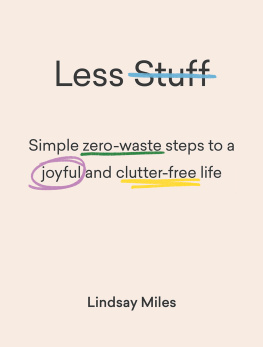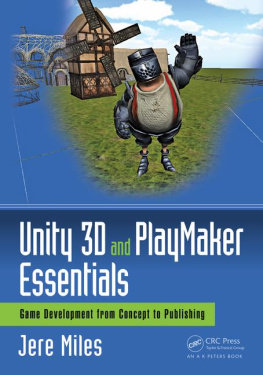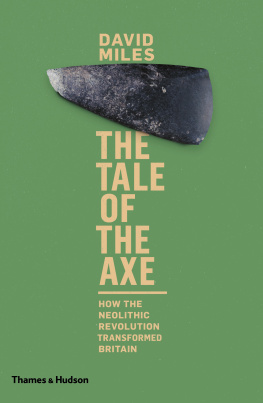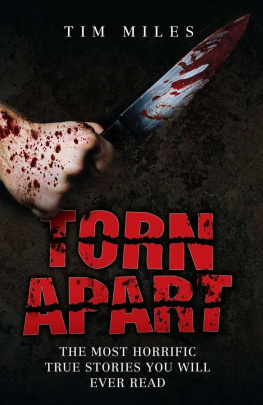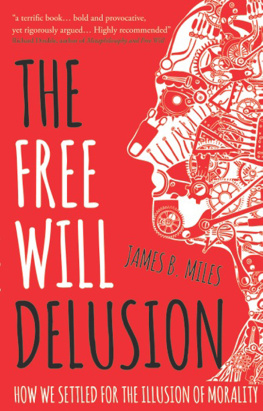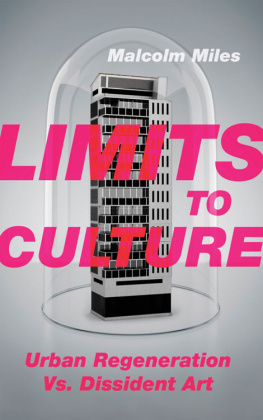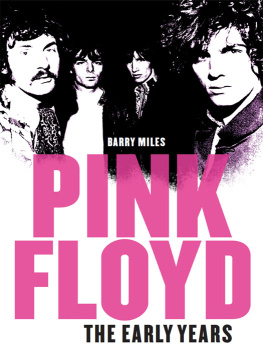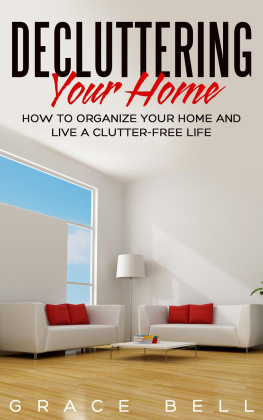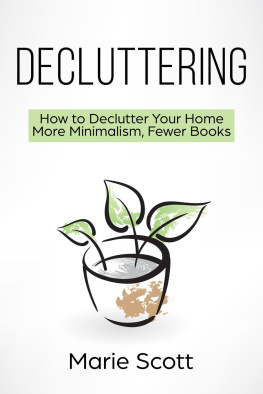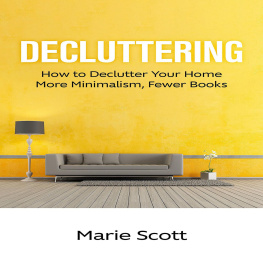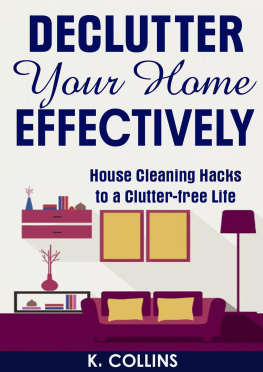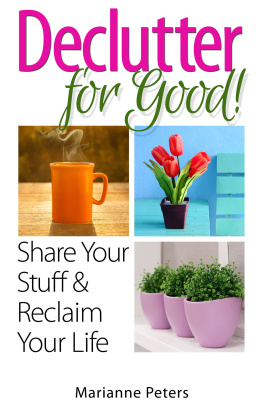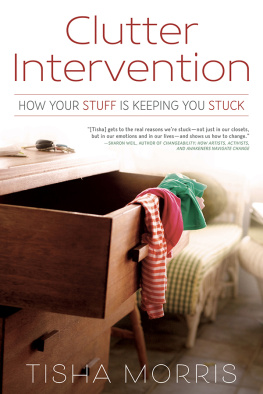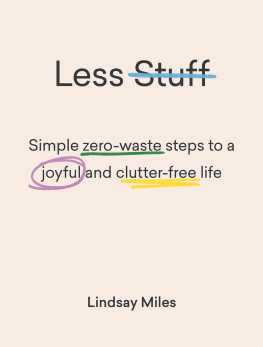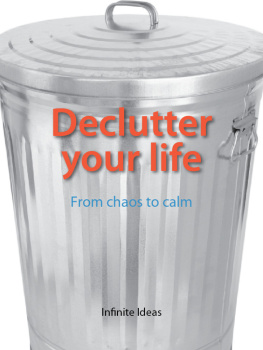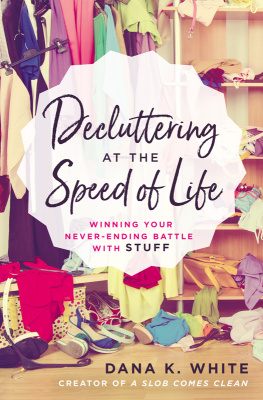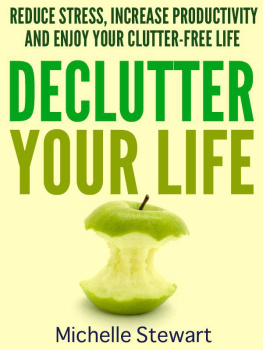Less Stuff is a low-waste project, with the editorial and design processes performed electronically. The print book is printed on stock certified by the Forest Stewardship Council (FSC): the highest standard forest certification scheme and a member of ISEAL Alliance, the global association for sustainability standards. The paper is cut to size prior to printing to reduce wastage, and any excess paper, plastic, wood and metal (such as printing plates) produced during the printing process is recycled. The book is also printed using sustainable soy-based inks, which produce less volatile organic compounds (VOCs) than petroleum-based alternatives and make it easier for any extra inventory to eventually be recycled.
Contents
Do you feel like you have too much stuff? Do you love the idea of decluttering, getting rid of the non-essentials and making space in your life for the things that are truly important, but youre not quite sure where to start? Do you worry about waste, and hold on to things you know in your heart you dont need because you cant bear the thought of throwing them in the bin? Would you like to find a way of letting go that doesnt mean contributing to landfill, or overloading the charity shops? Is your stuff making you feel a little bit guilty? Do you want to let go of the guilt once and for all?
When we think about how we love to spend our time, we dont think about sorting, or cleaning, or tidying. We want to spend less time doing the boring stuff, and more time on the things that matter. Things like catching up with friends and family, connecting with others and pursuing our dreams. Mess and clutter stand in the way of our productivity, stress us out and keep us stuck. Our stuff stands in the way of the lives we dream about.
Decluttering does not come naturally to me. I have more hoarding tendencies than minimalist tendencies or at least, I did. Yet over time, Ive learned to let go of things that I dont need. Ive created space and freed up time. Ive recognised that my possessions were holding me back, and making me feel anxious and guilty. Ive found freedom from the pursuit of more, and, as a result of letting go of things that had a hold on me, Im happier than Ive ever been. Ive found my enough. Want to know how I got from there to here? Let me tell you my story.
Decluttering is a skill, and, like so many skills, it comes down to practice. I had neither at the start of my journey. When I think about why I was hoarding stuff in the first place, there were a couple of reasons. One was that I cared about waste; I wasnt going to sling perfectly useful items in the bin, and I hadnt actually stopped to think about the alternatives. I was the person keeping things just in case. However, there was more to it than that. Id never needed to declutter. Id never learned to let things go. Somehow Id let the fact that stuff was inherently useful blur the real question: Was it useful to me?
As a kid, my bedroom was spacious, which meant there was plenty of room for stuff. I loved to collect things. There was never any need to get rid of anything, nor any inclination to do so. As I grew too old for toys and games, they were simply stored in the attic for later. I was never encouraged to part with my things, and so I didnt.
When I left school and moved across the country to study, later travelling and then renting, my excess stuff was stored at my parents place. I never had to deal with these things, to ask myself if I really needed them. By storing them, I put thinking about them aside.
Every Christmas and birthday, Id accumulate more stuff. When I started working and began to earn my own money, Id buy things that I liked, or needed, or wanted to purchase to cheer myself up. The amount of stuff I owned grew. I began to notice that the things I was receiving as gifts werent things that I needed. They were better versions of things that I already had with which there was nothing wrong or they were similar to things that I already had. Another handbag, another necklace, another pair of shoes. I justified keeping this stuff by telling myself that even if it wasnt useful now, it could be in the future. Id confuse liking something with a reason to buy it, or to keep it. I had a wardrobe full of clothes I didnt wear, which made me feel guilty every time I looked at them. Yet I always felt like I had nothing to wear, which would spur me to buy even more but this only led to more guilt. Embracing second-hand shopping made things worse: there were so many bargains that I seemed to accumulate more than ever before.
When I moved to Australia from the UK, youd assume Id have got rid of everything. I did get rid of the really big stuff: most of the furniture I owned, and stuff that couldnt be stored at my parents house. But you guessed it the stuff that could be taken to my folks was packed into boxes and stored. Just in case.
In Australia, starting afresh, I was determined not to acquire unnecessary stuff. I deliberately chose a small flat. Yet as the months passed, my home filled up with stuff I needed, along with stuff I thought I needed, and stuff I simply liked the look of. I started to notice my home was feeling squishy. Should I move to a bigger place? It was a turning point. I didnt want to pay more rent just to store a bunch of things I rarely used. I didnt need more storage. I needed less stuff. That was when my journey really began.
Bear in mind I was somebody who had never really tried to declutter before. Plus, I was fixated on this idea of not wasting stuff. It was a recipe for disaster. The first time I decided to declutter, it was a complete disaster. I dedicated a long weekend to the process. For three days, I mostly sat in a chair dreaming of how I wanted my space to be decluttered already, yet I was very reluctant to find anything to get rid of. I thought I was willing, but when it came down to it, I needed it all! At the end of the long weekend, I had decluttered a single box of stuff.
Despite this failure, I was determined to keep going. I could see the benefits that came with a life with less stuff, and thats what kept me motivated to continue trying. I came across the concept of minimalism, the practice of intentionally living with less and letting go of the excess. Some of the ideas minimalists were writing about struck a chord with me. But while they were big on the why, they were less clear on the how. I was sold on the benefits, and the after pictures were great, but how had these minimalists gotten there? What were the secrets?
I was frustrated that other people seemed to find decluttering and letting go so easy, when I found it so hard. I put it down to the fact that I cared about waste, when they perhaps did not. Without a method or a template to follow, I started trying things my own way: setting myself challenges, trying different things, or the same thing over and over. I started to notice patterns and to understand why I was resisting.
Then I had an epiphany, a realisation that decluttering and caring about waste actually go hand in hand. Decluttering doesnt have to be about wasting stuff. Its about identifying stuff that we own that is going to waste (because we dont use it, or dont like it, or dont need it) and finding a better place for it: a place where it will actually be used. Decluttering does not have to mean landfill. We can find new homes for our things, or places where the resources can be used again. Actually, its an important part of the process. Decluttering can be the opposite of waste.

